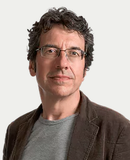 The Guardian (blog)
The Guardian (blog) "It is a campaign not for abundance but for austerity. It is a campaign not for more freedom but for less. Strangest of all, it is a campaign not just against other people, but against ourselves."
He may walk his talk, driving thrifty cars on book tours, opining at TED conferences, and eating roadkill. In a free society the right to make personal choices should be equal and inalienable for all. But his vision of individual rights, like the vision of those now sitting on county council, is not so fair or just. The totalitarian elites feel justified in their actions with an immense and superioristic rush, knowing what's best and saving the planet from the masses, the cretins who dare to disagree.
Watts Up With That
August 12, 2016
Guest essay by Eric Worrall
Prominent Guardian Environment Reporter George Monbiot, who sometimes shows up at prominent climate events, no doubt after a long journey by sail, has decided to eat Vegan supplemented with Roadkill to “reduce his impact” on the global climate.
I’ve converted to veganism to reduce my impact on the living world
The world can cope with 7 or even 10 billion people. But only if we stop eating meat. Livestock farming is the most potent means by which we amplify our presence on the planet. It is the amount of land an animal-based diet needs that makes it so destructive.
An analysis by the farmer and scholar Simon Fairlie suggests that Britain could easily feed itself within its own borders. But while a diet containing a moderate amount of meat, dairy and eggs would require the use of 11m hectares of land (4m of which would be arable), a vegan diet would demand a total of just 3m. Not only do humans need no pasture, but we use grains and pulses more efficiently when we eat them ourselves, rather than feed them to cows and chickens.
This would enable 15m hectares of the land now used for farming in Britain to be set aside for nature. Alternatively, on a vegan planet, Britain could feed 200 million people. Extending this thought experiment to the rest of the world, it’s not hard to see how gently we could tread if we stopped keeping animals. Rainforests, savannahs, wetlands, magnificent wildlife can live alongside us, but not alongside our current diet.
…
Then something happened that broke down the wall of denial. Last September I arranged to spend a day beside the River Culm in Devon, renowned for its wildlife and beauty. However, the stretch I intended to explore had been reduced to a stinking ditch, almost lifeless except for some sewage fungus. I traced the pollution back to a dairy farm. A local man told me the disaster had been developing for months. But his efforts to persuade the Environment Agency (the government regulator) to take action had been fruitless.
…
I still eat roadkill when I can find it, and animals killed as agricultural pests whose bodies might otherwise be dumped. At the moment, while pigeons, deer, rabbits and squirrels are so abundant in this country and are being killed for purposes other than meat production, eating the carcasses seems to be without ecological consequence. Perhaps you could call me a pestitarian.
…
Read more: https://www.theguardian.com/commentisfree/2016/aug/09/vegan-corrupt-food-system-meat-dairy
I quite like Monbiot, or at least I find him more entertaining than most greens.
Sometimes he shows a flash of common sense, such as when he defended nuclear power in the wake of Fukushima. Then he goes and blows it by saying something wild, such as telling everyone the corrupt media are keeping the end of the world a secret.
At least Monbiot is going to get enough protein, unlike some Vegans I know. The number of wild deer currently running around the British countryside, and all those impatient drivers trying to beat the rush, Monbiot is not going to starve – unless increasingly punitive British attempts to price driving out of reach of ordinary people finally succeed in clearing the roads of traffic.
Here's a quote from one of his blog posts...describing how he butchered roadkill:
I borrowed an axe and sharpened it on a stone, told the children what I was about to do, in case any of them had qualms, then chopped off the head, tail and feet. Immediately, a lively argument erupted over who was to claim these trophies. As I opened the abdominal cavity with my penknife, they pored over the guts, fascinated by the anatomy. They asked me to cut open the heart, to see what it looked like inside. I showed them the tiny atria and ventricles, in which the blood had clotted. Then I skinned the squirrel and stretched and salted the skin on a piece of plank, whereupon another dispute arose about who would take it home.
While the flavour of squirrel meat is excellent, it is also tough and on previous occasions I have stewed it. But that wasn’t possible at the barn, where there was only a barbecue and a camping stove. So I spatchcocked it and marinated it in lemon juice for a couple of hours, before we cooked it slowly on the barbecue. It was exquisite: tender and delicately flavoured.
I’ve eaten plenty of roadkill. I’ll take anything fresh except cats and dogs (my main concern is for the feelings of the owners, rather than the palatability of the meat, though it would require an effort to overcome the cultural barriers). But I was never before foolish enough to mention this eccentric habit on social media. I noted on Twitter how good the meat was and was greeted by protests.

 RSS Feed
RSS Feed
